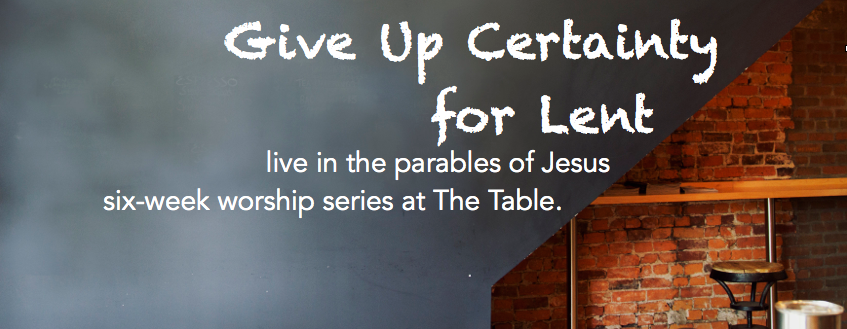The parables of Jesus take everyday experiences from the time of Jesus and turn them upside down. By showing us ordinary elements and experiences, parables provide a transparency to see the whole of our live and the holy in our lives in a new way (from John Indermark, Parables and Passion, Jesus’ stories for the days of Lent, page 11).
This week our worship will be rooted in Luke 18.9-14 Parable of the Pharisee and the Tax Collector.
It is hard to avoid interpreting this parable in simplistic terms. It is a very predictable parable! Even if you know very little about the Jesus you often have heard that Pharisees are regularly in opposition to him. Therefore it is easy to judge the Pharisee to be a self-righteous hypocrite and assume that the moral of this story is be humble. We might even catch ourselves thinking: “Lord, we thank you that we are not like other people: hypocrites, overly religious, self righteous, or even like that Pharisee. We come to church each week, listen to Scripture, attend our Kitchen Table and practice doing good, doing no harm and staying in love with you.”
David Lose commented on this in an article he wrote: “In order to avoid the kind of self-congratulatory reading of the parable that the parable itself would seem to condemn, it may help to note that, in fact, everything the Pharisee says is true. He has set himself apart from others by his faithful adherence to the law. He is, by the standards both Luke and Jesus seem to employ, righteous. So before we judge him too quickly, we might reframe his prayer slightly and wonder if we have uttered it ourselves. Maybe we haven’t said, “Lord, I thank you that I am not like other people…”, but what about, on seeing someone down on his/her luck, ‘There but for the grace of God go I’? It isn’t that the Pharisee is speaking falsely, but rather that the Pharisee misses the true nature of his blessing. As Luke states in his introductory sentence, he has trusted in himself. His prayer of gratitude may be spoken to the Lord, but it is really about himself. He locates his righteousness entirely in his own actions and being.
Where do you see God’s action in this parable? When was a time you trusted in yourself rather than trusting God?
What is an area of counting less on yourself and more on God that you might like to try this week?


0 Comments